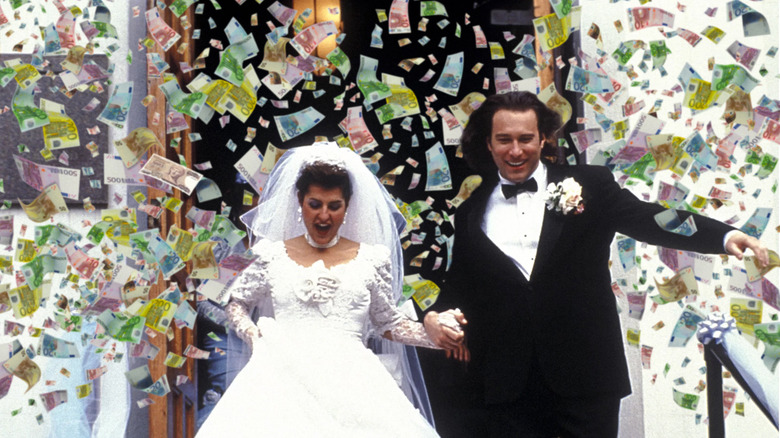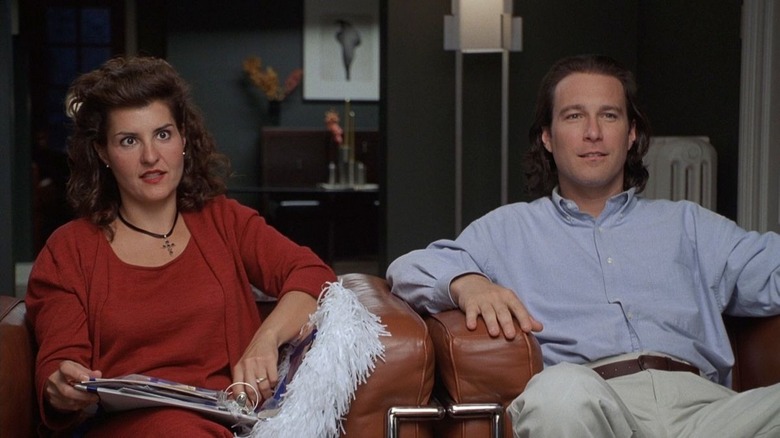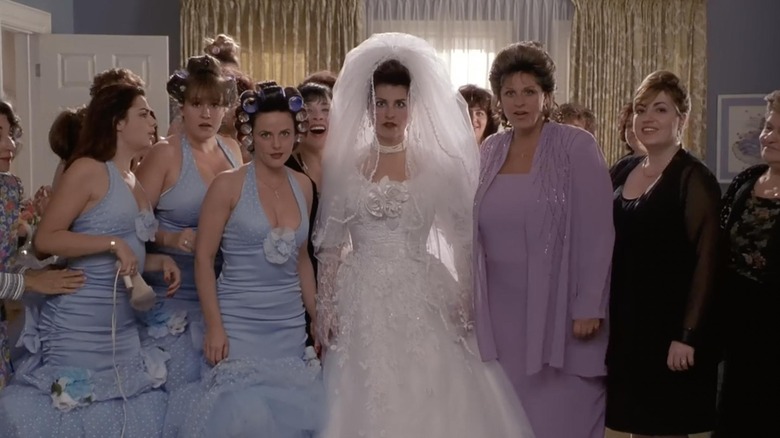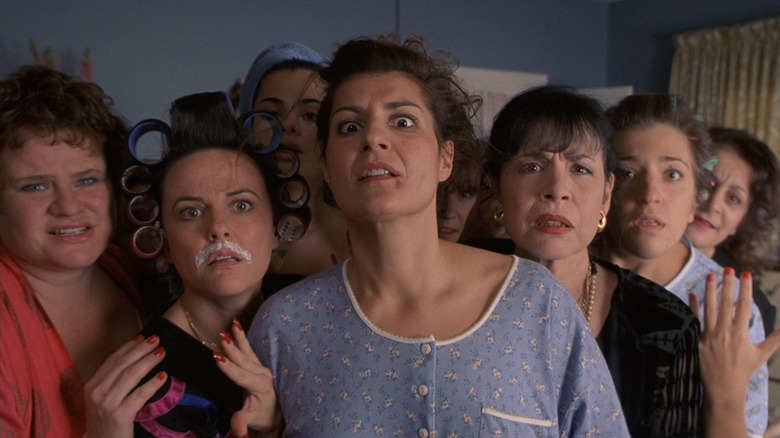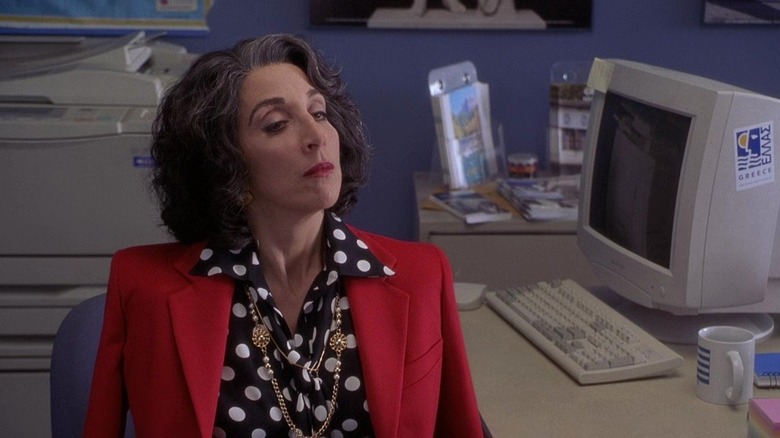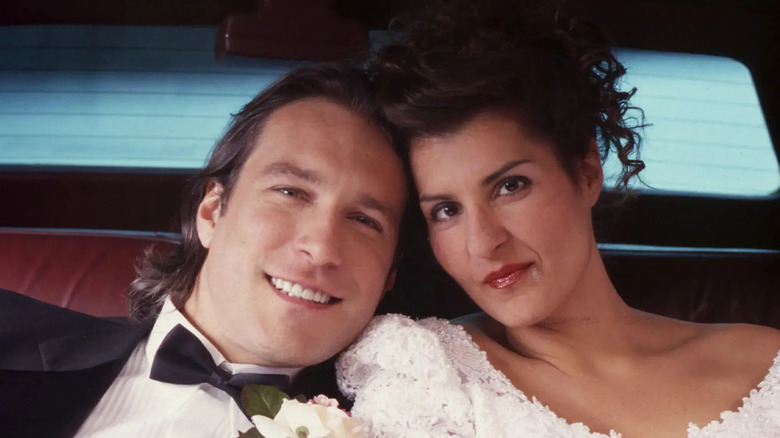How My Big Fat Greek Wedding Became The Biggest Rom-Com Ever At The Box Office
(Welcome to Tales from the Box Office, our column that examines box office miracles, disasters, and everything in between, as well as what we can learn from them.)
There are some Cinderella stories in the history of the box office. We can look at something like the ultra-low-budget "Skinamarink" earlier this year, which made more than $2 million after it became a genuine viral conversation starter online. Produced for just $15,000, it's a nice little success story for director Kyle Edward Ball. Such things happen from time to time in defiance of the industry norms. But the biggest Cinderella story of all time, in every sense, happened in 2002 when "My Big Fat Greek Wedding" had a run for the ages on its way to becoming the biggest rom-com ever. Take that, "Runaway Bride."
Even for those who have absolutely no interest in this particular genre, the journey of this movie is unquestionably fascinating. It all starts with writer and star Nia Vardalos, who turned a one-woman show into one of the most profitable movies ever made. To think that such a successful film was very nearly an HBO TV movie. And quite honestly, even now, the movie sort of seems suited to that method of consumption. Yet, here we are, more than 20 years later, with "My Big Fat Greek Wedding 3" in theaters hoping to make it a full trilogy of low-budget success stories.
In this week's edition of Tales From the Box Office, we're looking back at "My Big Fat Greek Wedding," how Tom Hanks and Rita Wilson helped get the movie made, what happened when it hit theaters in 2002, how it ended up becoming arguably the leggiest movie in cinema history, and what lessons we can learn from it all these years later. Let's dig in, shall we?
The movie: My Big Fat Greek Wedding
Vardalos originally wrote and performed "My Big Fat Greek Wedding" as a one-woman stage show, basing it on her real-life experience as a Greek woman who married a man who was not Greek. In the film's production notes, Vardalos quipped that she wrote it because "I wanted to get a better agent." She'd not only get a better agent, but a movie produced by none other than Tom Hanks, one of the most beloved and successful actors of the last four decades.
Actress Rita Wilson, who is married to Hanks and is herself Greek, saw a production of the show and fell in love with it. She Sent Hanks to see it and he fell in love as well. "He wrote me a beautiful letter — how marrying a Greek woman, and marrying into a Greek family had changed his life," Vardalos said in those same production notes. "I would call my mom every week or so and read her the letter and she would cry."
Hanks had recently started The Playtone Company along with his producing partner Gary Goetzman. A couple of months after seeing the show, he phoned Vardalos to let her know that they wanted to turn her play into a movie. Several other, larger production companies had offered to develop a movie. But not faithful to what Vardalos had written and, crucially, without her starring. That was a non-starter. Hanks, Goetzman, and Wilson, on the other hand, were willing to make the film with her in the starring role, even though Vardalos was not a star at the time. Hanks, in the production notes, mused that this was the right call. He wrote:
"She did a smart thing. She said 'This is my story and I want to play it.' That actually brings a huge amount of integrity to the piece, because it's Nia's version of her own life and her own experience. I think that shows through on the screen and people recognize it."
A dream comes to fruition
Even with the might of a straight-up power couple like Hanks and Wilson backing the project, it wasn't easy to get it going without an A-list cast. Most successful rom-coms up to that point were often star-driven affairs. Think "Pretty Woman" or "Sleepless in Seattle," in which, Hanks starred opposite Meg Ryan. Ultimately, they ended up footing the $5 million budget without a major studio partner, making this an independent production. "None of the studios would finance us," Wilson recalled recently to The Hollywood Reporter. "They wanted to replace Nia. They were like, 'We need somebody with a name.' And I kept thinking, 'But she's the writer. This is her story. The story's enough.'"
That story sees the Portokalos family worrying about Toula (Vardalos), who is still unmarried at 30 years old, and still working at the Greek restaurant owned by her parents. After taking a job at her aunt's travel agency, she falls head over heels for Ian, a handsome teacher. The only problem? He's not Greek. It's in casting Ian that the movie would get some star power, as John Corbett took the role following his turn on "Sex and the City."
Director Joel Zwick and Vardalos had Corbett in mind but they didn't believe it would work out, as it seemed like he wasn't going to be available. But then a chance meeting at a bar changed everything. "In walks John Corbett, right into the bar," Vardalos recalled to ABC News in 2018. "Our first choice, and he's in the same bar that we're in at the same hotel in Toronto."
"I just read this script in my room, 'My Big Fat Greek Wedding,' and I'm gonna be in it," Corbett said to his brother at the bar. Turns out, the production being pushed back two weeks freed him up. Things were starting to come together. It was but the first example of fate seemingly intervening to ensure that this movie was going to be a part of cinematic history.
The financial journey
IFC Films signed on to distribute the film. It's very much worth noting that, to this day, "My Big Fat Greek Wedding" is by far the company's biggest success. The next biggest? "Boyhood," which made $57 million worldwide. Not exactly a blockbuster. At this time the company was just a couple of years old, releasing movies that usually made a few million bucks. Record-breaking success didn't seem like a possibility.
"My Big Fat Greek Wedding" hit theaters on April 19, 2002, arriving on just 108 screens and placing 20th on the charts on its opening weekend with a $597,362 haul. "The Scorpion King" took the top spot that weekend, and it would be just the first of many number-one movies that would beat this rom-com on a weekly basis. In the long run, "MBFGW" came out ahead. What nobody could possibly predict is that genuine word of mouth from moviegoers started spreading. IFC didn't have a big marketing budget so the growth was organic. Week after week, moviegoers kept turning up, and the theater counts kept increasing.
It wasn't until August that the movie finally entered more than 1,000 theaters, at which time it also finally cracked the top five. The film also took in $11.1 million on the weekend of August 30, marking the first time it made more than $10 million in a single weekend. Mind you, this was more than four months after its initial rollout. This sort of thing simply doesn't happen. It was unheard of at the time. In our modern climate where movies live and die by a single weekend before being made available on VOD mere weeks later? It's unthinkable.
In the end, the movie played in theaters for a full year and, even though it never once topped the charts, it finished with a staggering $241.4 million domestically to go with $133.4 million internationally for a grand total of $374.8 million. Or, to put it another way, roughly 75 times its production budget.
Breaking down the unimaginable numbers
To illustrate just how impressive this movie's overall box office haul was, it ended up as the ninth biggest movie globally in 2002, placing ahead of two Steven Spielberg films in "Catch Me if You Can" ($352.1 million) and "Minority Report" ($358.3 million). It also made more money than "Chicago" ($306.7 million), which would go on to win Best Picture at the Oscars. All three of those movies were markedly more expensive to make and had bigger stars to anchor them.
"My Big Fat Greek Wedding" also still holds the record as the highest-grossing rom-com ever at the domestic box office. Yes, a select few have made more money worldwide, such as the "Sex and the City" movie ($418.7 million) but in that case, we're talking about a movie connected to a wildly successful HBO show. The fact that an independently produced movie with a very modest budget that never once topped the charts and earned consistently for a solid year remains the domestic record-holder is nothing shy of remarkable.
Amazingly, "MBFGW" held the distinction of being the highest-grossing movie ever that never topped the box office until "Sing" ($270.4 million domestic/$634.1 million worldwide) came along in 2016. It's also easily one of the most profitable films ever made — with CNBC naming it the single most profitable — as it represented a 6150% return on investment. Though "Paranormal Activity" might have something to say about that, there's no question "MBFGW" is in the conversation. But the way this movie did it? We're talking about one of the most impressive runs at the box office of all time.
The lessons contained within
Looking at the state of distribution in the movie business nowadays, the path to success carved out by "My Big Fat Greek Wedding" feels downright alien. Even looking at "My Big Fat Greek Wedding 3," it feels like a movie destined to play in theaters for just a few weeks before Focus Features puts it on VOD and its box office run is ultimately cut short in favor of home video sales. Granted, the movie feels all but assured to turn a profit, as "My Big Fat Greek Wedding 2" made $92 million against an $18 million budget in 2016. Still, there's not chance the third installment will get even a few good months in theaters, let alone a full calendar year.
I'm not saying that every movie needs to spend that long in theaters. In most cases, it would be the wrong movie. But there's really something to be said for letting a movie find its audience. Heck, look at how "Everything Everywhere All at Once" carved its path last year, opening to just $501,000 before eventually making $141 million worldwide. That slow rollout can still work even in today's streaming-dominated landscape. More movies should be afforded the opportunity to catch on.
The other thing that should not be ignored here is the authenticity factor. Vardalos wrote about her real-life experiences and brought her true self to that role. Casting someone else, or changing the story to fit a seemingly "safer" demographic would have been a catastrophic mistake. This movie resonated with people because it came from a real place and brought a new perspective to the table. Watering that down would have robbed the film of the unique charm that turned it into an absolute juggernaut. Unique perspectives like this may not be easy data points for the moneymen in Hollywood to look at but disregarding them would be to disregard potential hits that serve underserved audiences.
